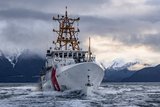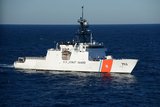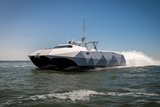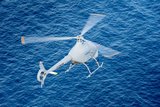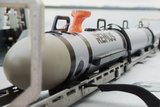US Navy completes testing of Q-20C
The US Navy has completed developmental testing of the Q-20C variant of the AN/AQS-20C towed mine-hunting sonar system, NAVSEA announced on 8 April.
The Q-20C variant features advanced acoustic and electro-optic sensing capabilities to detect, localise and classify bottom, close-tethered, moored and volume-moored mines. It includes improved capabilities, including the ability to search in multiple modes in the water column, which prepares the system to be integrated with its intended tow platform, the MCM unmanned surface vehicle (MCM USV) in 2020.
Recommendations from the test team will now be reviewed by the technical team for incorporation into the Q-20C for further evaluation.
The MCM USV is a long endurance, semi-autonomous, diesel-powered, all-aluminium surface craft that supports the deployments of various MCM payloads including Q-20C. It is part of the Littoral Combat Ship’s MCM mission package.
Related Equipment in Defence Insight
More from Naval Warfare
-
![How far will the US Navy’s FF(X) design deviate from the Legend-class?]()
How far will the US Navy’s FF(X) design deviate from the Legend-class?
The new frigate class’s focus on modularity, speed to build and enhanced armament align with the priorities of the US Navy’s Golden Fleet.
-
![How China’s naval advancements are pushing the US Navy to innovate]()
How China’s naval advancements are pushing the US Navy to innovate
The US Navy is set to invest $30 billion in artificial intelligence, cyber, space and autonomy research and development efforts in FY2026 as the force rethinks how it fights in light of China’s naval rise.
-
![UK and France signal shift to autonomous helicopters to boost naval power]()
UK and France signal shift to autonomous helicopters to boost naval power
Recent developments in France and the UK highlight how autonomous helicopters are becoming central to naval force design as navies seek to integrate crewed and uncrewed systems at sea.
-
![What HII’s UK expansion could mean for Royal Navy’s uncrewed future]()
What HII’s UK expansion could mean for Royal Navy’s uncrewed future
As HII prepares to deliver its latest AI-enabled uncrewed surface vessel later this year, its major UK facility expansion aligns with the UK Royal Navy’s plans for a hybrid fleet.







